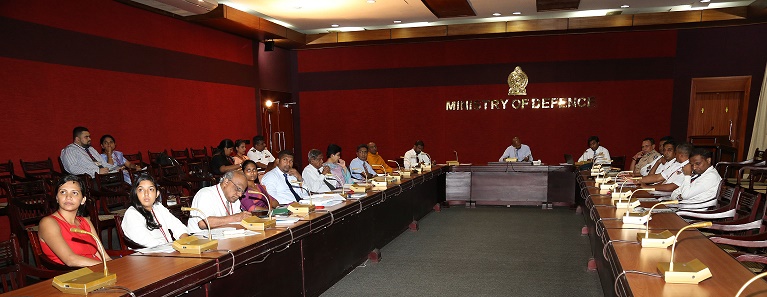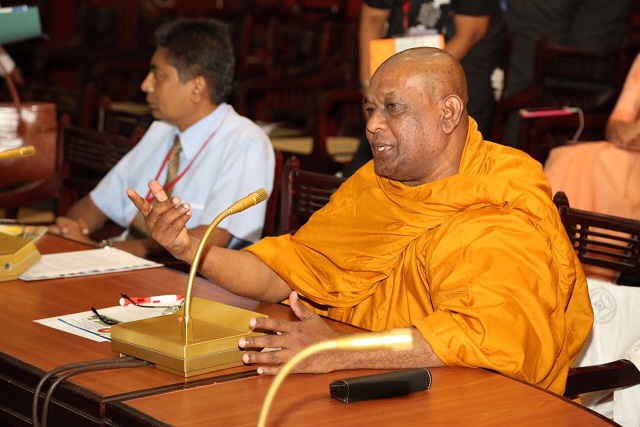Illicit Drugs a National Security Threat
Posted on October 10th, 2017
Press Release Institute of National Security Studies Sri Lanka
The Institute of National Security Studies Sri Lanka (INSSSL) held its Threat Lens on The Illicit Flow of Drugs and its Impact on Sri Lankan Youth” on October 3rd to coincide with World Temperance Day. The event was held at the Ministry of Defence in Colombo with the presence of key stakeholders including the clergy who are involved in the control of narcotics, experts from the medical profession and members of the armed forces of Sri Lanka.
Addressing the gathering, Director General of INSSSL Mr Asanga Abeyagoonasekera quoted from His Excellency the President Maithripala Sirisena’s recent speech at the United Nations General Assembly where he pledged: I underscore the need to implement a broader international response to the threat posed by drugs, and other intoxicants. As I see it, drug prevention and mitigation oriented programmes with a broad acceptance and consensus are the need of the day.” The Institute whose President is also His Excellency President Sirisena, advocates this view and considers the illicit flow of narcotics among Sri Lankan youth as a threat to national security.

To begin with, researchers of the Institute presented a comprehensive overview of the day’s theme with focus on the following areas: world context of illicit drug proliferation; threat landscape of Sri Lanka for the illicit flow of drugs; methods of trafficking; consumption patterns of drugs in Sri Lanka; initiatives taken by law enforcement to criminalize drugs; and the impact of drugs on youth in Sri Lanka. In this, they also addressed smuggling routes and methods of trafficking of narcotics into the country as well as the consumption patterns of drugs. The presentation also focused on success stories from Switzerland and Portugal that were shared in regard to the world context of illicit drug proliferation.
When considering the landscape of the illicit flow of drugs in Sri Lanka, the single most significant problem was seen as the trafficking of heroin from India for local consumption as Sri Lanka serves as a trans-shipment hub. It is significant that apart from Cannabis which is cultivated on a large scale in the provinces of eastern and southern Sri Lanka, all other drugs are imported, not locally produced. Numbers of drug related arrests have increased by 23% in 2015 when compared with the previous year and of the total drug related arrests, 32% was for heroin and 63% for cannabis. It is also a concern that most number of drug related arrests have been reported from the Western province (60%) where Colombo district contributed to 43% of the total.

The presentation also highlighted the legal aspect to counter this issue drawing from drug laws, local and international. In addition to the many internal legal mechanisms such as the Convention Against Illicit Traffic in Narcotic Drugs and Psychotropic Substances and the Sri Lanka National Policy for the Prevention and Control of Drug Abuse, Sri Lanka is a signatory to the three UN conventions on drug abuse and trafficking which are the Convention on Narcotic Drugs, 1961; Convention on Psychotropic Substances, 1971 and the Convention against Illicit Traffic in Narcotic Drugs and Psychotropic Substances, 1988. To counter this problem, there also exists regionally, South Asian Association for Regional Co-operation Convention Against Illicit Traffic in Narcotic Drugs and Psychotropic Substances.
Furthermore, It is a concern that the drug menace also contributes to related social and security issues such as money laundering, human trafficking and arms trafficking. To respond to these threats, measures have been adopted by the present government of Sri Lanka. The Presidential task force on drug prevention was established by President Sirisena in 2015 with the aims of reducing the use of Alcohol, Tobacco and other illegal drugs and thus reducing the negative consequences of using such substances. The task force was also created with the people’s wellbeing in mind in order to improve productivity and reduce poverty. The primary objective is decreasing the usage, transport and sale of Illegal Drugs by 80% by the year 2020. Further objectives are that of preventing newcomers from starting the usage of drugs; reducing the hazardous and harmful behaviours of current users; reducing the number of victims admitted to hospitals due to effects of usage of drugs; efficiently and correctly educating the public regarding direct and indirect harm caused by drugs.
Specifically, the impact of narcotics on youth is a disturbing factor with the highest number of users being those in their teens. It is In order to address this concern, several initiatives such as youth engagement activities, awareness programmes and workshops are being held nation-wide at present. As such, the free flow of drugs among youth results in increased crime, adversely affecting mental and physical health, academic performance, relationships and economic productivity.
Recommendations of INSSSL in this regard, were directed towards taking away the stigma of drugs and make a gateway for medical treatment available to all. A requirement for a United Nations institutional training that would assist in capacity building was also suggested while the government established Centre for Sharing Intelligence on Drug Trafficking being strengthened which will enable sharing of intelligence not only domestically but also regionally.
In the engaging and informative discussion that followed, experts in the area of anti-narcotics and law enforcement shared their views on best practices in drug prevention. In this regard, four steps to consider for drug prevention were how structurally capable the country is in dealing with the drug menace, the mindset of the leadership, law enforcement authorities and the public, challenges in technical and human resources in managing the issue and safeguarding the privacy of individuals. Herein, as much as the focus is on regional and global methods of trafficking there is still a need to address the internal factors and patterns of drug usage with a more coordinated approach, methodologies and techniques for its control. Also highlighted was the need to consider the transnational nature of this phenomenon with its high revenue aspect that at times overpowers even the rule of law.
Important proactive (prevention, detection) and reactive (investigation, persecution) measures employed in managing the issue were pointed out by law enforcement authorities. Dynamics of the prisons system where criminals forge links with youth contributing to the distribution of drugs and increased crime was an area suggested for future study.
As regards positive developments, it was noted that there has been a clear policy against the tobacco industry in the country which has resulted in the decline of consumers in recent years whilst the policy on alcohol remains ambivalent. It was suggested that INSSSL should link up wth presidential task force to create a comprehensive national policy.
In conclusion, it was suggested by those present that addressing the root causes for the use of drugs should be investigated and further researched. A loss of values resulting in the degradation of society has contributed to the escalation of this problem in recent times. Therefore, it is imperative to seek answers within religion, family and society.